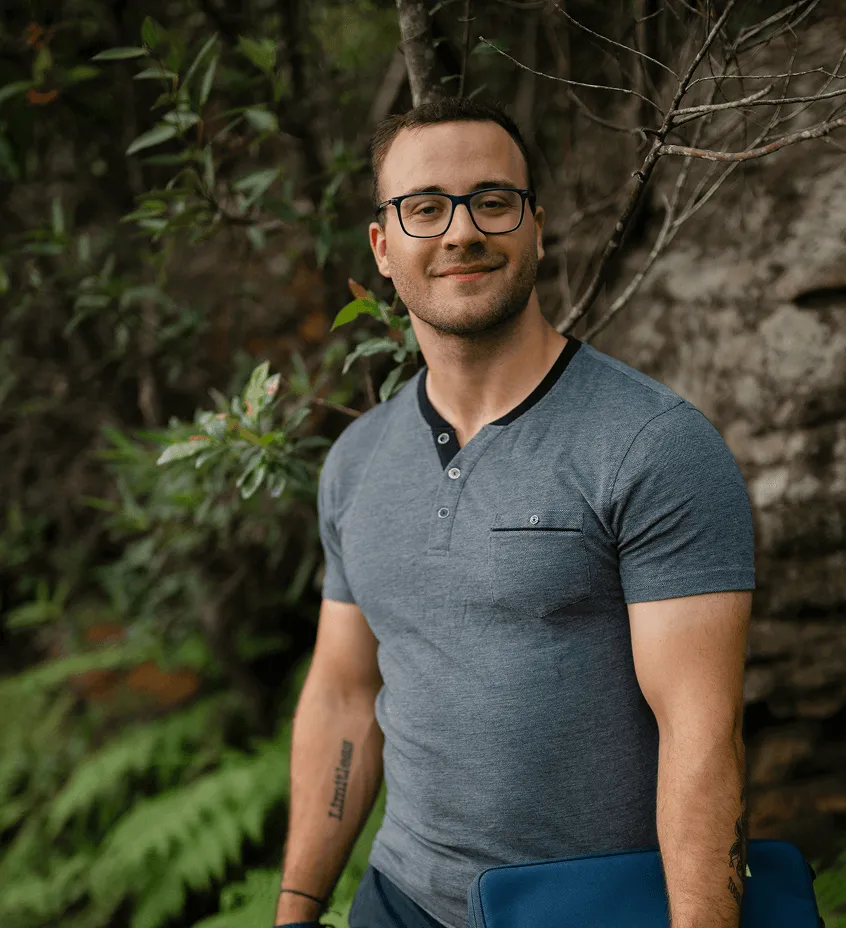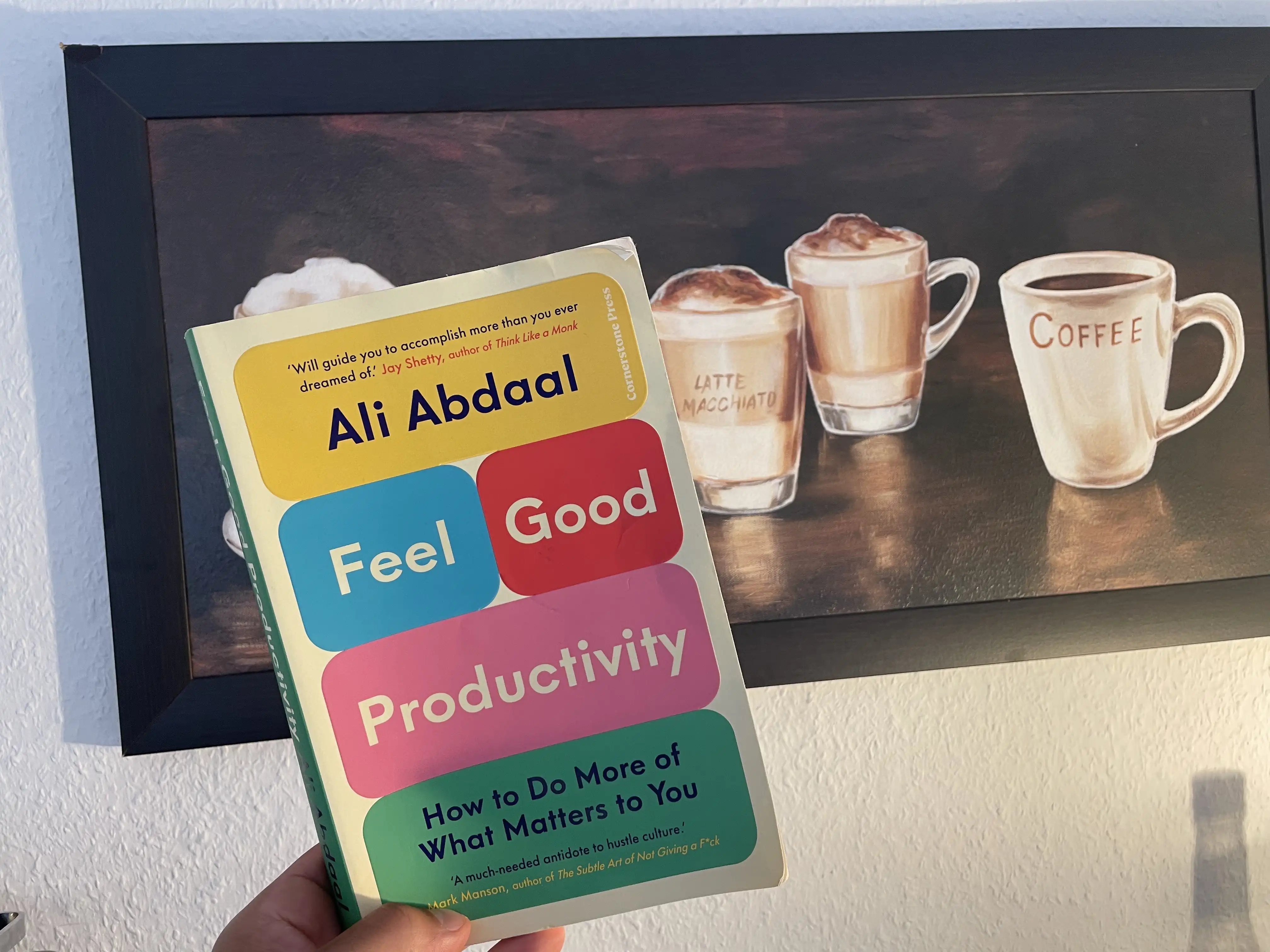
- Remote Work
- Mindset
- Productivity
- Focus
Living and Working Happier: My Experience with Ali Abdaal’s ‘Feel Good Productivity’

Per Starke
Last updated: 15/08/2025
Approx. 5 min read

Balancing productivity and well-being in today’s fast-paced world can feel like walking a tightrope. Some people thrive on the hustle, others recoil at the word “productivity.” I used to fall somewhere in between—constantly searching for a way to get meaningful things done without sacrificing what I value most: time, freedom, and a sense of calm.
That’s when I discovered Ali Abdaal’s book Feel Good Productivity. His approach—using your time intentionally for things that matter and feel good in the process—immediately resonated. The idea that productivity should feel energizing, not draining, was a perspective I hadn’t found elsewhere.
My journey with this mindset started during my first trip to Australia in 2024. Inspired by my sister (who kept sending me his videos), I began applying Ali’s principles to both my studies and my work. Over those 8 weeks, I not only stayed fully on top of client projects and university work, but also felt more aligned and fulfilled than ever. It genuinely changed how I work and how I live—and it’s a big part of how I now shape my day-to-day life.
Let me share how Feel Good Productivity has influenced me and what it might unlock for you.
What is ‘Feel Good Productivity’?
At its core, Feel Good Productivity is about using your time intentionally to do what matters—without burning out. It’s not about checking off endless tasks or chasing the next milestone. It’s about working in a way that feels good, is sustainable, and leads you toward the kind of life you actually want to build.
Unlike traditional productivity systems that focus purely on output, this approach encourages you to enjoy the process and align your daily actions with your values. That simple but powerful shift is what makes it so transformative.
Key Concepts from ‘Feel Good Productivity’
Play
Making work feel like play is central to this mindset. That doesn’t mean you never do hard things—but you find joy in how you approach them. For me, this means working in inspiring places, putting on adventurous music, and letting my inner “explorer” and “competitor” personalities show up in how I structure my workday.
Power
Ali describes “Power” as the moment when you want to shout, “I can do it!” That feeling of confidence makes a huge difference. I’ve found that the more I see progress in things that matter to me, the more capable and energized I feel—and that loops back into everything else I do.
People
Productivity doesn’t happen in isolation. Sharing your progress, working with others, or even having a quick call with a friend can make the journey more fun and motivating. Especially in a location-independent lifestyle, staying connected is part of staying on track.
Unblock
The first step to making progress is often getting out of your own way. Whether it’s clarifying your “why,” overcoming fears, or just making it easier to start—Feel Good Productivity gives you tools to stop overthinking and start doing.
Sustain
Working well is not about constantly pushing. It’s about knowing when to pause, recharge, and realign. This means recognizing what actually gives you energy—and what drains it. For me, it’s about scheduling real breaks, going on hikes, playing music, and cutting down on anything that leaves me feeling flat.
How I Apply It in My Own Life
Alignment
When what I do lines up with what I care about, everything flows better. Studying becomes more motivating when it supports my long-term goals (like continuing to live and work from inspiring places). Writing posts or building websites feels energizing because I care about the impact I create for others. And contributing to meaningful projects—whether it’s for local businesses or international clients—feels like a clear expression of what I want to stand for.
Creative Environment
I often work from different cafés or outdoor spots. This feeds my “explorer” side and makes the workday feel like a little adventure. Great drinks help too—nothing beats working with a view and an ice-cold orange-tonic mocktail in hand.
Recharge Rituals
I actively schedule the things that actually recharge me: walks, guitar sessions, quiet reading time, travel adventures, or just staring out the window with good music. I block these into my calendar as intentionally as I plan work sessions. It makes a huge difference in energy and clarity.
Micro-Challenges
As a naturally competitive person, I love setting mini goals—whether it’s writing 1000 words faster than last time or learning a new song by the weekend. This adds an element of fun and keeps me moving even on tougher days.
Tips for Getting Started
- Start small. Try adding one joyful thing to your next work session—music (lord of the rings soundtrack for work – a vibe hard to beat!), a nicer location, or a clearer reason for doing the task.
- Ask the question: “What would this look like if it were fun?” I love that one. It’s such a simple but powerful mindset shift.
- Customize. Take the parts that resonate with you, leave the rest. The beauty of Feel Good Productivity is that it adapts to your life—not the other way around.
Final Thoughts
Feel Good Productivity isn’t a rigid system—it’s a lens. It helped me reconnect with what I want my work and life to feel like. That includes building toward financial and business goals that support the travel-rich lifestyle I love, while creating value in ways that feel authentic.
If you’re someone who wants to work better, live better, and do it in a way that feels good—this approach might just be the mindset shift you’ve been looking for.